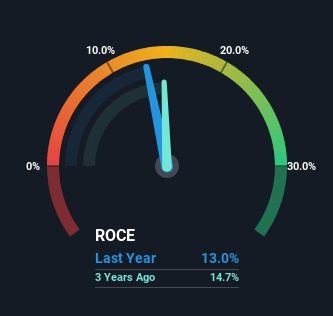The Returns On Capital At Colonial Motor (NZSE:CMO) Don't Inspire Confidence
What are the early trends we should look for to identify a stock that could multiply in value over the long term? Firstly, we'd want to identify a growing return on capital employed (ROCE) and then alongside that, an ever-increasing base of capital employed. This shows us that it's a compounding machine, able to continually reinvest its earnings back into the business and generate higher returns. However, after briefly looking over the numbers, we don't think Colonial Motor (NZSE:CMO) has the makings of a multi-bagger going forward, but let's have a look at why that may be.
Understanding Return On Capital Employed (ROCE)
Just to clarify if you're unsure, ROCE is a metric for evaluating how much pre-tax income (in percentage terms) a company earns on the capital invested in its business. The formula for this calculation on Colonial Motor is:
Return on Capital Employed = Earnings Before Interest and Tax (EBIT) ÷ (Total Assets - Current Liabilities)
0.13 = NZ$51m ÷ (NZ$625m - NZ$236m) (Based on the trailing twelve months to December 2023).
Thus, Colonial Motor has an ROCE of 13%. In isolation, that's a pretty standard return but against the Specialty Retail industry average of 17%, it's not as good.
Check out our latest analysis for Colonial Motor
Historical performance is a great place to start when researching a stock so above you can see the gauge for Colonial Motor's ROCE against it's prior returns. If you're interested in investigating Colonial Motor's past further, check out this free graph covering Colonial Motor's past earnings, revenue and cash flow.
What Can We Tell From Colonial Motor's ROCE Trend?
When we looked at the ROCE trend at Colonial Motor, we didn't gain much confidence. To be more specific, ROCE has fallen from 20% over the last five years. On the other hand, the company has been employing more capital without a corresponding improvement in sales in the last year, which could suggest these investments are longer term plays. It may take some time before the company starts to see any change in earnings from these investments.
In Conclusion...
To conclude, we've found that Colonial Motor is reinvesting in the business, but returns have been falling. And with the stock having returned a mere 6.7% in the last five years to shareholders, you could argue that they're aware of these lackluster trends. Therefore, if you're looking for a multi-bagger, we'd propose looking at other options.
Colonial Motor does come with some risks though, we found 2 warning signs in our investment analysis, and 1 of those is significant...
While Colonial Motor isn't earning the highest return, check out this free list of companies that are earning high returns on equity with solid balance sheets.
Have feedback on this article? Concerned about the content? Get in touch with us directly. Alternatively, email editorial-team (at) simplywallst.com.
This article by Simply Wall St is general in nature. We provide commentary based on historical data and analyst forecasts only using an unbiased methodology and our articles are not intended to be financial advice. It does not constitute a recommendation to buy or sell any stock, and does not take account of your objectives, or your financial situation. We aim to bring you long-term focused analysis driven by fundamental data. Note that our analysis may not factor in the latest price-sensitive company announcements or qualitative material. Simply Wall St has no position in any stocks mentioned.
Have feedback on this article? Concerned about the content? Get in touch with us directly. Alternatively, email editorial-team@simplywallst.com

 Yahoo Finance
Yahoo Finance 
